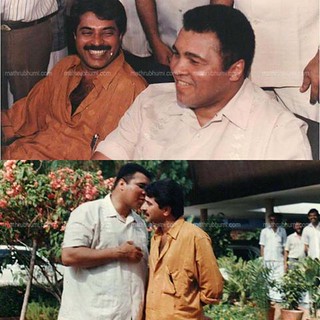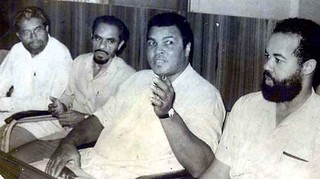By Shafeeq Hudawi, TwoCircles.net
Kozhikode: The death of Mohammed Ali was one of those moments when the popularity of a person went much beyond the popularity of the sport he participated in. Even if you had never donned a pair of boxing gloves, or watched a boxing match, it was impossible to have not heard of Ali. No wonder then, that his death was a sad moment for millions across the globe. While many mourned his death in India too especially on social media, it would not be wrong to say that his death never became a topic of much discussion in regional media.

Mohammed Ali with actor Mammootty
Except, of course, Kerala.
Kerala has always taken its heroes seriously, and Ali, famous for his exceptional social life that outshined his achievements in the ring, was no different. The news of his death was followed by condolence messages from both the common citizens as well as noted personalities like actors. Even though the Kerala Sports Minister EP Jayarajan was ridiculed for calling Ali an athlete from Kerala during a telephonic talk to a Malayalam channel, it showed how seriously the state took the matter of his death. Do you know of any other sports minister commenting on Ali’s death?
Political circles in Kerala have often taken pride in how they go an extra mile in embracing any idea raised against imperialism and colonialism. Unlike other states in the country, Latin American revolutionists Che Guevara and Salvador Allende have been accorded due place in Kerala. It is a state where it is not uncommon to see images of Che Guevara stuck on autorickshaw windows, bikes and flex boards placed by political parties. By raising a strong voice against racial discrimination and unjust wars along with embracing Islam, Ali too emerged an as anti imperialist within America. This made Ali a hero across the world, and Kerala was no different. Remember, this was the time when political parties, inclding the Congress and left parties, were competing against each other mood in preaching socialism and anti-imperialism in 1960s and 1970s.
Newspapers in Kerala allocated front page for him on the second day of his demise and spent substantial part in hailing resistance by Ali towards racism and imperialism. During the television discussions, sports persons were extremely vocal about his courageous battle against the system which relegated Black people to second-class citizens.
All Malayalam dailies ranging from the large ones like Malayala Manorama; Mathrubhumi; CPIM mouthpiece Deshabhimani; IUML mouthpiece Chandrika and Madhyamam; to evening news papers including Kaumudi Flash and Rashtradeepika allocated a lot of space to Ali. Local editions of national dailies like The Times of India, The Hindu and The New Indian Express carried the news of his sad demise in the front page with powerful images from Alis life.

Mohammed Ali visiting Madhyamam Daily’s office
“With his shivering hands, the man suffering from parkinson’s hit the American white attitude, laced with hatred against black and racism, till the final moment of life. Ali is hailed by the entire world for his unflinching battles against racism rather than the winnings in the rings,” said the editorial of Kerala Kaumudi daily.
“Ali was a victim rather than a champion. Victim of the racism, prevalent in America even after slave trade came to an end,” Mathrubhumi’s editorial said.
“It was a sight of elegance while the Olympic torch was handed over to the hands of a parkinson’s patient in Atlanta in 1996. The moment was that of a much awaited revenge and that of a black man, who himself left his mark in the world sports history,” it went on to say.
“If my mind can conceive it, and my heart can believe it – then I can achieve it- Muhammad Ali” Malayalam actor Mammootty’s Facebook page read.
The mega star, who shared some light moments in Kozhikode during his Kerala trip, commemorated him as a great man, adorned with simplicity.
“Ali was a man with little self pride. He asked me about the fight in films when I told him that I was a film star and posed for a photo with me with his typical punch,” Mammootty said.
Ali had the power to attract masses during visit to Kerala
Ali’s refusal to be part of the Vietnam War also came at a time when Egyptian and Iraqi leaders Gamal Abdel Nasser and Saddam Hussein were seen to be taking an anti America stand through their Ba’ath Party, which advocated pan Arabism. The slogan, unity, liberty and socialism, raised by the party, got fans in Kerala even though it failed to successfully take off in Arab countries.
By embracing Islam, Ali won hearts of Keralites just like Hussein and Nasser did through their anti-America stands. Remember, the state had witnessed one day’s hartal when Saddam was executed by America in 2006. For long time, Malayali leaders, in their speeches, have glorified Saddam for daring to take on America. Similarly, Ali is also respected for having thrown his medal into the river after winning the gold medal at Olympic Games of 1960 to protest against racial discrimination.
It is important here to point out that even though Ali embraced Islam, he never spent much time in preaching the religion and hardly followed rituals. But Muslims in Kerala were well aware of this fact when Muhammed Ali visited the state in 1989. Still, he was accorded a warm reception by Muslim organisations. Further, thousands of people waited to catch a glimpse of him wherever he went during his four-day visit. Ali visited Kozhikode to take part in the silver jubilee celebrations of Muslim Educational Society (MES) following the invitation by KP Hassan Haji, one of the office bearers of the MES and secretary of JDT Islam, one of the leading Muslim institutions in Kerala. Ali attended MES’ silver jubilee celebrations along with actor Dileep Kumar, Justice Fathima Beevi and IUML state president Panakkad Syed Mohammed Ali Shihab Thangal. Though Ali didn’t speak at the function, he was the man who created waves among the masses. For the masses, he was a real hero and a symbol of resistance against imperialism.
In 1988, Hassan Haji met Muhammed Ali in Saudi Arabia when he went to perform Haj along with his family. Hassan Haji, who stayed in the same hotel, informed Ali about the charity initiatives taken up by JDT Islam. A man with simplicity and ardent support to the humanitarian activities, Ali was quite impressed with the charity initiatives by JDT and visited the institution after he was invited by Hassan Haji. The boxing icon also spent a few hours with the inmates of the JDT orphanage, which is one of the prominent Muslim orphanages in Kerala.
No wonder then, why the death of Ali, the Greatest, created such a massive outpour of emotions. He may have spent just a few days in Kerala, but for a state that loves its icons irrespective of their nationality, Ali was indeed one of their own.

